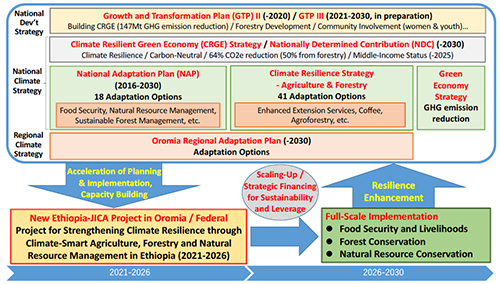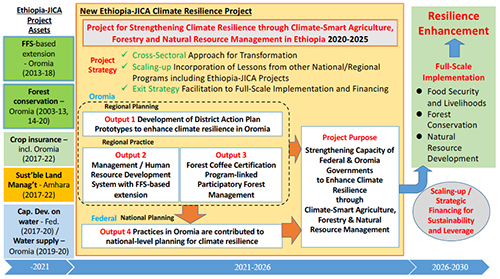Outline of the Project
Project Name
Project for Strengthening Climate Resilience through Climate-Smart Agriculture, Forestry, and Natural Resource Management in Ethiopia ("Climate Resilience Project")
Subject
Natural Environment Conservation
Country
Ethiopia
Date R/D Signed
September 4, 2020
Project Site
Oromia Region, Ethiopia
Term of Cooperation
Mar. 15, 2021 to Mar. 14, 2026
Implementing Organization
Responsible Agency: ECCCD (Environment and Climate Change Coordination Directorate), Ministry of Agriculture
Implementing Agency: Oromia Bureau of Agriculture (OBA) and Oromia Environment Protection Authority (OEPA)
Cooperation Agency: Environment Protection Authority (EPA)
Background
This project aims to strengthen the capacity of Federal Government and Oromia Regional Government to enhance climate resilience, as a process to promote CRGE. The target region is Oromia, and main sectors the project addresses are agriculture, forestry, and natural resource management. These sectors are the most important for Oromia Region and local communities as well as the country at large, but those are also vulnerable to climate change. Achievements by the Project are expected to contribute to the Federal Government planning process to promote CRGE. Relevance of the Project to Strategies of Ethiopia is shown below.

Under the Project, District Action Plan templates according to Adaptation Planning Zones (APZs) of Oromia are developed in Oromia to strengthen the planning process for climate resilience (Output 1). "CRGE CR Strategy Agriculture & Forestry (2015)" identifies 14 APZs in the country, classified through clustering 32 Agro-Ecological Zones. Oromia covers 12 of them except "sub-moist north" and "extreme moist highland" zones. Process to enhance resilience of local community are supported by two activities, which are Farmer Field School (FFS)-based extension (Output 2) and the Forest Coffee Certification Program (FCCP)-linked Participatory Forest Management (PFM) (Output 3). These practices in Oromia that enhance climate resilience are shared with the Federal Government to strengthen their national planning process on CRGE (Output 4).
Assets of past and on-going projects between Ethiopia and JICA are utilized to boost the project implementation, which includes those agriculture, forestry, natural resource management, water management, and any others that enhance climate resilience. The project concept is shown below.

The first reason why Oromia is selected as the target region is that the official request of the new project was made by the GoE to the GoJ with the target site of Oromia. Secondly, Oromia is strategic as the target site because it has the largest area (353 thousand km2), population (29.5 million people), and forest (9 million ha) in the country, and it covers diverse climate and agro-ecological zones. Thirdly, Oromia has been identified vulnerable to climate change with risks and hazards in natural conditions such as flood and drought, and social vulnerability including conflicts. Furthermore, Oromia covers 12 APZs out of 14 in the country. Fourthly, the GoE with JICA have implemented several projects in Oromia so far including in agriculture, forestry, natural resource management, and water sectors, which could contribute to enhance climate resilience. Thus, these are a pile of assets of both the GoE and JICA to benefit the new project in its implementation.
The Overall Goal
Climate resilience is enhanced through climate-smart agriculture, forestry, and natural resource management in Ethiopia.
Project Purpose
Capacity of Federal Government and Oromia Regional Government is strengthened to enhance climate resilience through climate-smart agriculture, forestry, and natural resource management.
Output
Output 1:
District Action Plans according to Adaptation Planning Zones (APZs) in Oromia are developed in pilot districts, with its templates for other districts, to strengthen the planning process for climate resilience.
(Implementing Agency: OEPA and OBA)
Output 2:
Systems for management and human resource development are developed for promoting climate-smart agriculture and natural resource management with Farmer Field School (FFS)-based extension to enhance climate resilience in Oromia.
(Implementing Agency: OBA)
Output 3:
"Forest Coffee Certification Program (FCCP)-linked Participatory Forest Management (PFM) Model for forest coffee areas in Oromia" is developed to enhance climate resilience in Oromia.
(Implementing Agency: OEPA)
Output 4:
Practices in Oromia to enhance climate resilience are utilized at federal-level planning for climate resilience.
(Responsible Agency: Ministry of Agriculture)
Project Activities
| 1-1. | Study all Adaptation Planning Zones (APZs) in Oromia to select 3 (tentative) APZs for which the Project develops District Action Plan templates. |
| 1-2. | Select 3 pilot districts representing the selected APZs for developing respective Action Plans for climate resilience at district-level, based on the review of district profiles in Oromia. |
| 1-3. | Develop District Action Plans of the 3 pilot districts to enhance climate resilience with inputs from Outputs 2 and 3 in a participatory manner. |
| 1-4. | Develop 3 templates of District Action Plan for respective APZs, based on activities from 1-1 to 1-3. |
| 1-5. | Support the pilot districts to prepare necessary resources (e.g. finance, personnel) to implement their plans. |
| 1-6. | Hold workshops to share experience and lessons on Action Plan development from the pilot districts to other districts. |
| 2-1. | Make an action plan to scale-up FFS to promote climate-smart agriculture and natural resource management in entire Oromia region. |
| 2-2. | Develop an FFS-based extension management system for climate-smart agriculture and natural resource management. |
| 2-3. | Develop an FFS-based extension human resource development system for climate-smart agriculture and natural resource management. |
| 2-4. | Propose monitoring indicators to assess climate resilience based on practices from Activities of 2-1 to 2-3. |
| 2-5. | Organize seminar(s) to share practices and lessons learned on climate resilience with FFS-based extension, with Federal Government and other Regional State Governments. |
| 3-1. | Develop "Forest Coffee Certification Program (FCCP)-linked Participatory Forest Management (PFM) Model for forest coffee areas in Oromia" to enhance climate resilience. |
| 3-2. | Finalize the guideline and promote its use through participatory workshops among relevant stakeholders in forest coffee areas in Oromia. |
| 3-3. | Organize seminar(s) to share the developed guidelines and lessons learned on climate resilience through sustainable forest management with stakeholders in Oromia and the Federal Government. | 4-1. | Document lessons and recommendation to strengthen national-level planning process for climate resilience based on practices in Oromia. |
| 4-2. | Organize seminar(s) to share practices in Oromia in enhancing climate resilience with other regional states. |
| 4-3. | Explore fund access opportunities for climate resilience enhancement in cooperation with other programs. |
Inputs
[Japanese side]
- Dispatch of long-term or short-term experts
- Local activity cost
- Provision of equipment
- Training in Japan
Inputs
[Ethiopia side]
- Assignment of Project Personnel
- Office space for the project, facilities and equipment
- Local operational cost
- About JICA
- News & Features
- Countries & Regions
- Our Work
- Thematic Issues
- Types of Assistance
- Partnerships with Other Development Partners
- Climate Change / Environmental and Social Considerations
- Evaluations
- Compliance and Anti-corruption
- Science and Technology Cooperation on Global Issues
- Research
- JICA Development Studies Program / JICA Chair
- Support for the Acceptance of Foreign HRs / Multicultural and Inclusive Community
- Publications
- Investor Relations
